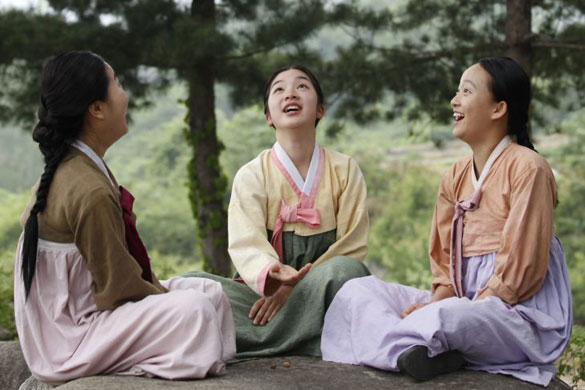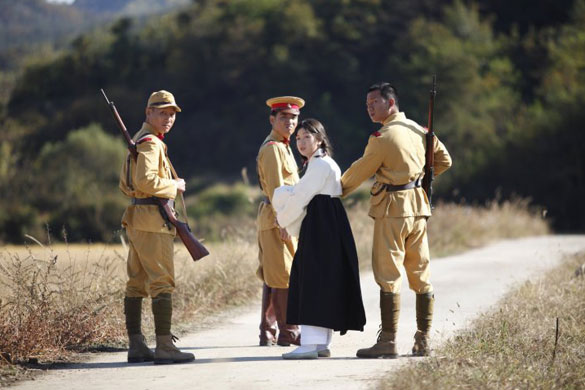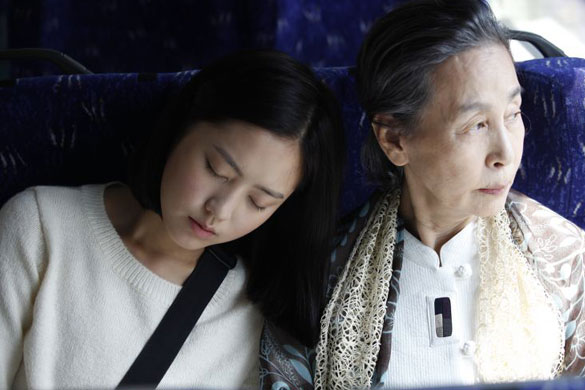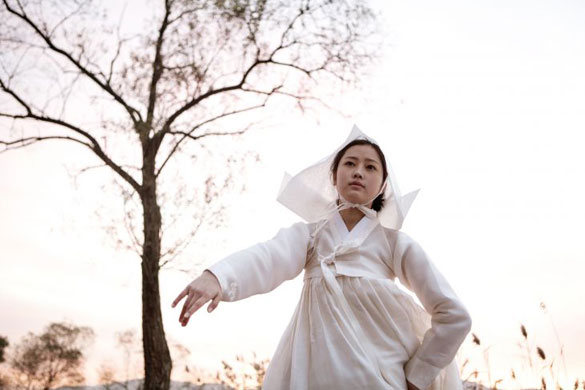
 |
||||
1943, Japan-occupied Korea: 14-year-old Jung-min (Kang Ha-na)is roughly, forcibly taken from her family by Japanese soldiers and thrown onto a train with a number of other mid-teen Korean girls from various provinces. For the duration of their journey in a dank, dirty, bare and windowless boxcar, these innocent abductees have no idea where they are being taken or what will befall them but on arrival in China their terrible fate becomes all too clear. For, they are to be forced into being ‘comfort women’ to Japanese Imperial troops, required to serve their every sexual whim and often twisted, even violent, desires.
Review: The abhorrent use by the Japanese military of young Korean women as sex slaves during the occupation has long been, and continues to be, a wholly topical subject. For years these wronged women have campaigned for acknowledgement of and justice for their terrible plight, with many sadly dying before any real public admission was given by Japanese authorities. Their fight has been both arduous and protracted – and it could even be said that no acknowledgement, no recompense could ever be sufficient – and, as such, any film whatsoever on the subject of comfort women is of vital importance in telling these poor women’s stories around the world and ensuring they are never, ever forgotten or swept aside.
In the early stages of the 1940s timeline story, Jung-min is shown in her day-to-day carefree life prior to her abduction. A strong-willed, self-confident young girl who is happy to undertake bets with her friends (on games she knows she can win) to gain possession of jewellery and the like that she wants, regardless of knowing that when her mother finds out she’ll beat her legs with a cane until they bleed. That self-assurance comes to serve her well as her terrible fate as a comfort woman begins and continues, allowing her to hold herself together, be a pillar of strength for the other girls in the same situation and endure the unbearable. But of course any show of strength in the face of violent adversity brings with it a risk of retribution. The 1940s timeline of Spirits' Homecoming also points to the desperate need of Koreans as a whole under Japanese rule to remain Korean while the Japanese try to obliterate their country's language and culture, with Arirang (Korea’s unofficial national anthem) repeatedly sung by characters (Jung-min and her friends, Jung-min and her father). In fact, as Jung-min and her father sing Arirang as they travel home through the countryside, Spirits' Homecoming for just a moment feels reminiscent of Im Kwon-taek’s Sopyonje, in which the main characters sing Arirang while travelling. While Spirits' Homecoming isn’t quite on the same level as Sopyonje (Im Kwon-taek is the master of Korean cinema, after all), just as Sopyonje uses the singing of Arirang to underline the desire for Korean traditionalism to survive in the face of modernity, Spirits' Homecoming screams of Korea’s need to continue as a country and culture in the face of Japanese obliteration.
A talisman made by Jung-min’s mother to protect her from anything untoward - and given to her just prior to her being taken away by Japanese soldiers - allows a linking of the 40s and more modern timelines and leads directly to the Spirits' Homecoming ritual - a shaman spiritual rite allowing a lost soul to return home and find peace. But while this ritual is the narrative’s ultimate destination, director Cho Jung-rae uses the journey to it to reference attitudes and feelings both societal and personal in relation to these women who were essentially forced into prostitution so many years earlier. For example, when the Korean government calls for comfort women to come forward there are no responses whatsoever in the province where our main elderly lady character lives and when she herself considers stepping forward she hesitates at the last moment, underlining the embarrassment these women feel about their past even though they are in reality utterly blameless. Not only that, but one of the civil servants employed to take the names of comfort women coming forward even claims that they would have to be insane to admit their pasts, the exact attitude the women fear that played a part in many of them continuing to hide what befell them in their youth.
Spirits' Homecoming (귀향) / 2016 / directed by Cho Jung-rae
|
||||
All images © JO Entertainment Review © Paul Quinn |
||||



